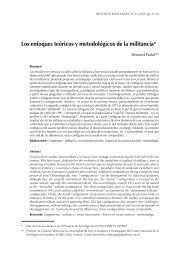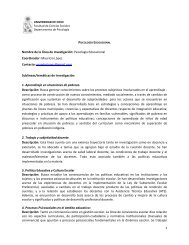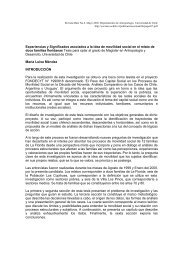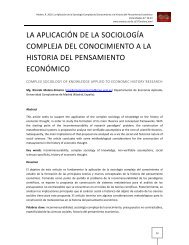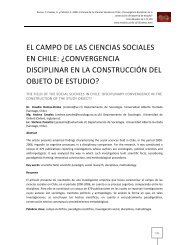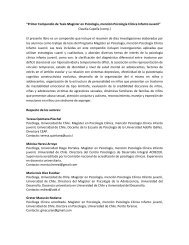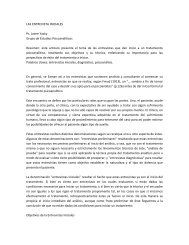La Dimension Cultural de la Gestion de Asentamientos Humanos ...
La Dimension Cultural de la Gestion de Asentamientos Humanos ...
La Dimension Cultural de la Gestion de Asentamientos Humanos ...
Create successful ePaper yourself
Turn your PDF publications into a flip-book with our unique Google optimized e-Paper software.
Revista Mad. No.5. Septiembre 2001. Departamento <strong>de</strong> Antropología. Universidad <strong>de</strong> Chilehttp://sociales.uchile.cl/publicaciones/mad/05/paper06.htmand the pursuit of sustainable <strong>de</strong>velopment a reality at the local level through theimplementation of 'local Agenda 21s' and other sustainable <strong>de</strong>velopmentprogrammes. Non -governmental organizations, educational institutions, thescientific community and the media have increased public awareness anddiscussion of the re<strong>la</strong>tions between environment and <strong>de</strong>velopment in all countries.The involvement, role and responsibilities of business and industry, includingtransnational corporations, are important. Hundreds of small and <strong>la</strong>rge businesseshave ma<strong>de</strong> 'green business' a new operating mo<strong>de</strong>. Workers and tra<strong>de</strong> unionshave established partnerships with employers and communities to encouragesustainable <strong>de</strong>velopment in the workp<strong>la</strong>ce. Farmer-led initiatives have resulted inimproved agricultural practices contributing to sound resource management.Indigenous people have p<strong>la</strong>yed an increasing role in addressing issues affectingtheir interests and particu<strong>la</strong>rly concerning their traditional knowledge and practices.Young people and women around the world have p<strong>la</strong>yed a prominent role ingalvanizing communities into recognizing their responsibilities to futuregenerations. Nevertheless, more opportunities should be created for women toparticipate effectively in economic, social and political <strong>de</strong>velopment as equalpartners in all sectors of the economy.Se indica que los medios han incrementando <strong>la</strong> conciencia y discusión <strong>de</strong> <strong>la</strong>s re<strong>la</strong>ciones entre e<strong>la</strong>mbiente y el <strong>de</strong>sarrollo.III. Implementation of Agenda 21 in areas requiring urgent actionA. Integration of economic, social and environmental objectivesChanging consumption and production patterns28. Unsustainable patterns of production and consumption, particu<strong>la</strong>rly in theindustrialized countries, are i<strong>de</strong>ntified in Agenda 21 as the major cause ofcontinued <strong>de</strong>terioration of the global environment. While unsustainable patterns inthe industrialized countries continue to aggravate the threats to the environment,there remain huge difficulties for <strong>de</strong>veloping countries in meeting basic needs suchas food, health care, shelter and education for people. All countries should strive topromote sustainable consumption patterns; <strong>de</strong>veloped countries should take thelead in achieving sustainable consumption patterns; <strong>de</strong>veloping countries shouldseek to achieve sustainable consumption patterns in their <strong>de</strong>velopment process,guaranteeing the provision of basic needs for the poor, while avoiding thoseunsustainable patterns, particu<strong>la</strong>rly in industrialized countries, generally recognizedas unduly hazardous to the environment, inefficient and wasteful, in their<strong>de</strong>velopment processes. This requires enhanced technological and otherassistance from industrialized countries. In the follow-up of the implementation ofAgenda 21, the review of progress ma<strong>de</strong> in achieving sustainable consumptionpatterns should be given high priority. Consistent with Agenda 21, the <strong>de</strong>velopmentand further e<strong>la</strong>boration of national policies and strategies, particu<strong>la</strong>rly inindustrialized countries, are nee<strong>de</strong>d to encourage changes in unsustainableconsumption and production patterns, while strengthening, as appropriate,international approaches and policies that promote sustainable consumptionpatterns on the basis of the principle of common but differentiated responsibilities,applying the polluter pays principle, and encouraging producer responsibility andgreater consumer awareness. Eco-efficiency, cost internalization and productpolicies are also important tools for making consumption and production patternsmore sustainable. Actions in this area should focus on:(h) Encouraging the media, advertising and marketing sectors to help shapesustainable consumption patterns.(i) Improving the quality of information regarding the environmental impact ofproducts and services and, to that end, encouraging the voluntary and transparentuse of eco-<strong>la</strong>belling.52



